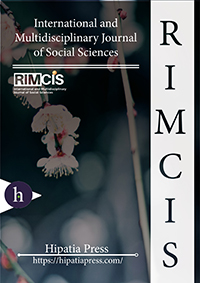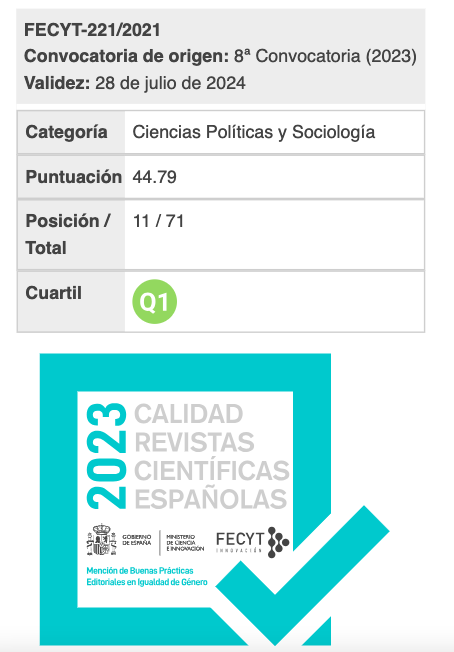In the Path to Regaining Social Sciences Legitimacy through Public Sociology
Keywords:
Downloads
Abstract
In the process of approval of the European Commission Horizon 2020, research in the Social Sciences and Humanities (SSH) has been under threat. Not only new liberals, but also migrant movements, Roma organizations, feminists, and other citizens have questioned social sciences as a valid instrument to contribute to overcome the crisis and its related inequalities, especially in Europe. In this framework, this article discusses the role that public sociology plays for social sciences to regain legitimacy in current times. Particularly, the article defends that this regaining of prestige can be done through the study of Successful Actions, which have proven effective in reducing inequalities wherever they have been implemented. Drawing on the INCLUD-ED research, a large-scale project of the EU Framework Programme of Research (2006-2011), the article analyses the impact of implementing Successful Actions in the improvement of quality of life in one of the poorest neighbourhoods of SpainDownloads
References
Asociación Miguel Fenollera (2011a): Presentación de la Cooperativa Miguel Fenollera, (online).
Google Scholar Crossrefhttp://ajmiguelfenollera.blogspot.com.es/2011/11/presentacion-de-la-cooperativa-miguel.html, accessed 2 May 2012.
Google Scholar CrossrefAsociación Miguel Fenollera (2011b): Blog Asociación Miguel Fenollera, (online).
Google Scholar Crossrefhttp://ajmiguelfenollera.blogspot.com/2011/02/la-universidad-de-castilla-la-mancha.html, accessed 20 April 2012.
Google Scholar CrossrefAubert, A. & Flecha, A. (2009). Contract on dialogic inclusion: how to get out of the ghetto. Psychology, Society & Education, 1: 61–70.
Google Scholar CrossrefAubert, A. (2011). Moving beyond social exclusion through dialogue. International Studies in Sociology of Education, 21(1): 63-75.
Google Scholar CrossrefAubert, A., Elboj, C., García, R. & García J. (2010). Contrato de Inclusión Dialógica. Revista Interuniversitaria Formación del Profesorado, 24(1): 101-111.
Google Scholar CrossrefGoogle Scholar Crossref
Brandsma, J. (2001). Education, equality and social exclusion: Final synthesis report. DG for Research: European Commission (online). ftp://ftp.cordis.europa.eu/pub/improving/ docs/ser_clusters_education_social_exclusion_synthesis.pdf, accessed 3 April 2012.
Google Scholar CrossrefBergmann, N., Scambor, E., & Wojnicka, K. (2014). Framing the Involvement of Men in Gender Equality in Europe: Between Institutionalised and Non-Institutionalised Politics. Masculinities and Social Change, 3 (1), 62-8.
Google Scholar CrossrefBrown, M., Gómez A. and Munté, A. (2013). Procesos dialógicos de planificación de los servicios sociales: el proceso de cambio en los barrios de La Milagrosa y La Estrella (Albacete). Scripta Nova. Revista Electrónica de Geografía y Ciencias Sociales. [En línea]. Barcelona: Universidad de Barcelona, 20 de enero de 2013, vol. XVII, nº 427 (6). <http://www.ub.es/geocrit/sn/sn-427/sn-427-6.htm>.
Google Scholar CrossrefBurawoy, M. (2005). The Critical Turn to Public Sociology. Critical Sociology, 31(3): 313-326.
Google Scholar CrossrefBurawoy, M. (2007). For Public Sociology, in D. Clawson et al. (eds.), Public Sociology: fifteen eminent sociologists debate politics and the profession in the twenty-first century, London: University of California Press.
Google Scholar CrossrefCREA. (2001-2004). WORKALÓ. The creation of new occupational patterns for cultural minorities. The Gypsy case. RTD project, 5th Framework Programme of Research. Improving the Socio-economic Knowledge Base. Brussels, Belgium: Directorate-General for Research, European Commission.
Google Scholar CrossrefCREA. (2006-2011). INCLUD-ED: Strategies for inclusion and social cohesion in Europe from education. RTD project, 6th Framework Programme. Citizens and Governance in a Knowledge-based Society. Brussels, Belgium: Directorate-General for Research, European Commission.
Google Scholar CrossrefDumay, X., Cattonar, B., Maroy, C., Mangez, C. (2013). The Local Institutionalization of Accountability in Education: Network and Bureaucratic Modes of Implementation. International Journal of Sociology of Education, 2(2), 99-141.
Google Scholar CrossrefEuropean Commission. (2010a). Communication from the Commission. EUROPE 2020. A strategy for smart, sustainable and inclusive growth. COM(2010) 2020. Brussels: European Commission.
Google Scholar CrossrefEuropean Commission (2010b). Communication from the Commission. The European Platform against Poverty and Social Exclusion. A European framework for social and territorial cohesion. COM(2010) 758. Brussels: European Commission.
Google Scholar CrossrefEuropean Commission. (2011). Cooperation Work Programme 2011. Brussels: CORDIS FP7 European Commission.
Google Scholar CrossrefEuropean Comission. Research & Innovation (2011). Education & Society. Strengthen education to build social cohesion (online). http://ec.europa.eu/research/headlines/news/article_11_11_25_en.html, accessed 1 May 2012.
Google Scholar CrossrefEuropean Council (2010). Europe 2020: A European strategy for smart, sustainable and inclusive growth, Brussels: European Commission.
Google Scholar CrossrefEuropean Parliament (2008). Impact of Cohesion Policy on the Integration of Vulnerable Communities and Groups, Brussels: European Commission.
Google Scholar CrossrefEuropean Union Agency for Fundamentals Rights (2009). European union minorities and discrimination survey. Data in focus report. The Roma. Budapest: EU-MIDIS.
Google Scholar CrossrefFine, Michelle and Lois Weis (1996). Writing the ‘wrongs’ of fieldwork: confronting our own research/writing dilemmas in urban ethnographies. Qualitative Inquiry, 2(3): 251–274.
Google Scholar CrossrefFlecha, R., Gómez, J. & Puigvert, L. (2003). Contemporary Sociological Theory, New York: Peter Lang.
Google Scholar CrossrefFlecha, R. (2011). The dialogic sociology of education. International Studies in Sociology of Education, 21(1): 7-20.
Google Scholar CrossrefFlecha, R. & Soler. M. (2013). Turning difficulties into possibilities: engaging Roma families and students in school through dialogic learning. Cambridge Journal of Education, 43 (4): 451-465.
Google Scholar CrossrefFreire, P. (1997). A la sombra de este árbol. Barcelona: El Roure.
Google Scholar CrossrefFung, A. & Wright, E.O. (2001). Deepening Democracy: Innovations in Empowered Participatory Governance. Politics & Society, 29(1): 5-41.
Google Scholar CrossrefGanz, M. (2009). Why David Sometimes Wins: Leadership, Organization, and Strategy in the California Farm Worker Movement, Oxford: Oxford University Press.
Google Scholar CrossrefGanz, M. (2010). Leading change: Leadership, organization, and social movements. N. Nohria, N. & Khurana, R. (eds.), Handbook of leadership theory and practice. Boston: Harvard Business School Press: 527-568.
Google Scholar CrossrefGarcía Ortiz, A. (2011). Entrevista a Javier López-Fando, Presidente de la Asociación Miguel Fenollera. La Verdad (online). http://www.laverdad.es/albacete/v/20110307/albacete/gustaria-constituir-cooperativa-alrededor-20110307.html, accessed 5 April 2012.
Google Scholar CrossrefGarcía, R., Mircea, T. and Duque E. (2010). Socio-cultural Transformation and the Promotion of Learning. Revista de Psicodidáctica, 15(2), 207-222.
Google Scholar CrossrefGatt, S. Ojala, M. & Soler, M. (2011). Promoting social inclusion counting with everyone: Learning Communities and INCLUD-ED. International Studies in Sociology of Education, 21(1): 33-47.
Google Scholar CrossrefGómez, J., Latorre, A., Sánchez, M. & Flecha, R. (2006). Metodología comunicativa crítica. Barcelona: El Roure Ciencia.
Google Scholar CrossrefGómez, A., Puigvert, L. and Flecha, R. (2011). Critical Communicative Methodology: Informing real social transformation through research. Qualitative Inquiry, 17(3): 235-245.
Google Scholar CrossrefHabermas, J.(1975). Legitimation crisis. Germany: Beacon Press.
Google Scholar CrossrefHabermas, J. (1984). Teoría de la acción comunicativa: Complementos y estudios previos. Madrid: Cátedra.
Google Scholar CrossrefINCLUD-ED (2010). Working papers: Case studies of local projects in Europe. Brussels: Directorate-General for Research, European Commission.
Google Scholar CrossrefLee, R. E. (2003). Putting Humpty Dumpty back together again? The structures of knowledge and the future of the social sciences. Futures, 35: 621-632.
Google Scholar CrossrefMelgar, P., Larena, R., Ruiz, L., & Rammel, S. (2011). How to Move from Power-based to Dialogic Relations? Lessons from Roma Women. European Journal of Education, 46(2), 219–227
Google Scholar CrossrefMerton, R. K. (1957). Social theory and social structures. Free Press: Glencoe, III.
Google Scholar CrossrefMinisterio de Ciencia e Innovación. (2010). EU Spanish Presidency, Conclusions “Science against Poverty” Conference, 8-9 April, La Granja (online)
Google Scholar Crossrefhttp://www.scienceagainstpoverty.es/Publico/Resultados/conclusiones/__Recursos/Draft-Conclusions_summary.pdf, accessed 15 December 2011.
Google Scholar CrossrefMinisterio de Educación, Políticas Sociales y Deporte (2008). El plan de intervención social de los barrios de la Estrella y laMilagrosa de Albacete obtiene sus primeros resultados [The plan for social intervention in La Estrella and La Milagrosa neighborhoods in Albacete gets its first results]. (online). http://sid.usal.es/mostrarficha.asp?id=13542&fichero=1.1, accessed 25 April 2012.
Google Scholar CrossrefSordé, T. & Mircea, T. (2011). How to turn difficulties into opportunities: drawing from diversity to promote social cohesion. International Studies in Sociology of Education, 21(1), 49 – 62.
Google Scholar CrossrefPadrós, M., García, R., De Mello, R. & Molina S. (2011). Contrasting scientific knowledge with knowledge from the lifeworld: The Dialogic Inclusion Contract. Qualitative Inquiry, 17 (3), 304-312.
Google Scholar CrossrefPuigvert, L. (2012). The Dialogic Turn: Dialogue or Violence?. International and Multidisciplinary Journal of Social Sciences, 1(1): 78-96.
Google Scholar CrossrefPuigvert, L., Christou, M. & Holdford, J. (2012). Critical Communicative Methodology: including vulnerables voices in research through dialogue”, Cambridge Journal of Education, 42 (4).
Google Scholar CrossrefRedondo, G., Santa Cruz, I. & Rotger, J.M. (2011). Why Mondragon? Analyzing what works in overcoming inequalities. Qualitative Inquiry, 17(3), 277-283.
Google Scholar CrossrefRodríguez, H. & Flecha, R. (2011). La Revolución Científica y Democrática en Educación. Multidisciplinary Journal of Educational Research, 1(1), 34-52.
Google Scholar CrossrefSocio-economic sciences and humanities for the future of Europe (2011). Making research work: SSH challenges for the EU Framework Programme Horizon 2020 and beyond “Understanding Europe in a global context– transitions towards innovative and inclusive societies”. An Open Letter to the European Commissioner for Research and Innovation, Máire Geoghegan-Quinn (online). http://www.eash.eu/openletter2011/docs/OpenLetter_final_layout.pdf, accessed 10 May 2012.
Google Scholar CrossrefSztompka, P. (1991). Society in Action. The Theory of Social Becoming. Chicago: University of Chicago Press.
Google Scholar CrossrefValls, R. & Padrós, M. (2011). Using dialogic research to overcome poverty: from principles to action. European Journal of Education, 46(2), 173-183.
Google Scholar CrossrefWeber, M. (2009). La objetividad del conocimiento en la ciencia social y en la política. Madrid: Alianza (original work published in 1904).
Google Scholar CrossrefWright, E. O. (2010): Envisioning real utopias. London: Verso.
Google Scholar CrossrefDownloads
Published
Almetric
Dimensions
How to Cite
Issue
Section
License
All articles are published under Creative Commons copyright (CC BY). Authors hold the copyright and retain publishing rights without restrictions, but authors allow anyone to download, reuse, reprint, modify, distribute, and/or copy articles as the original source is cited.















